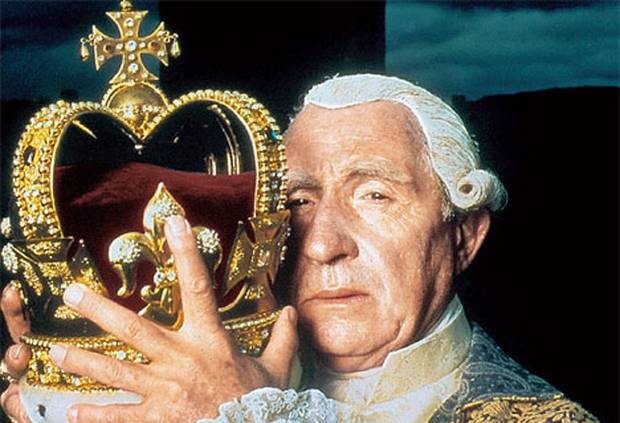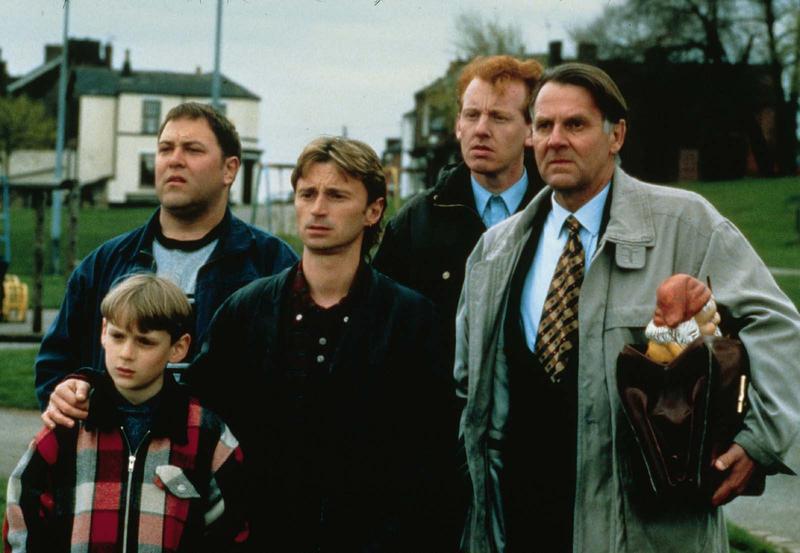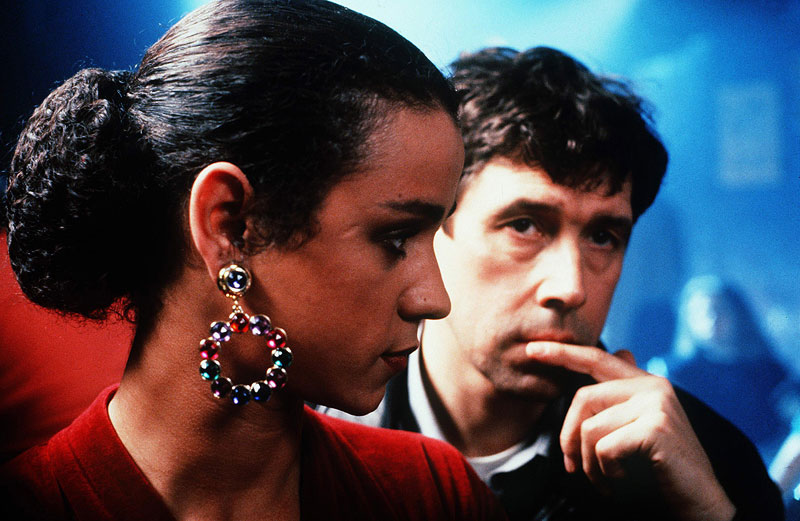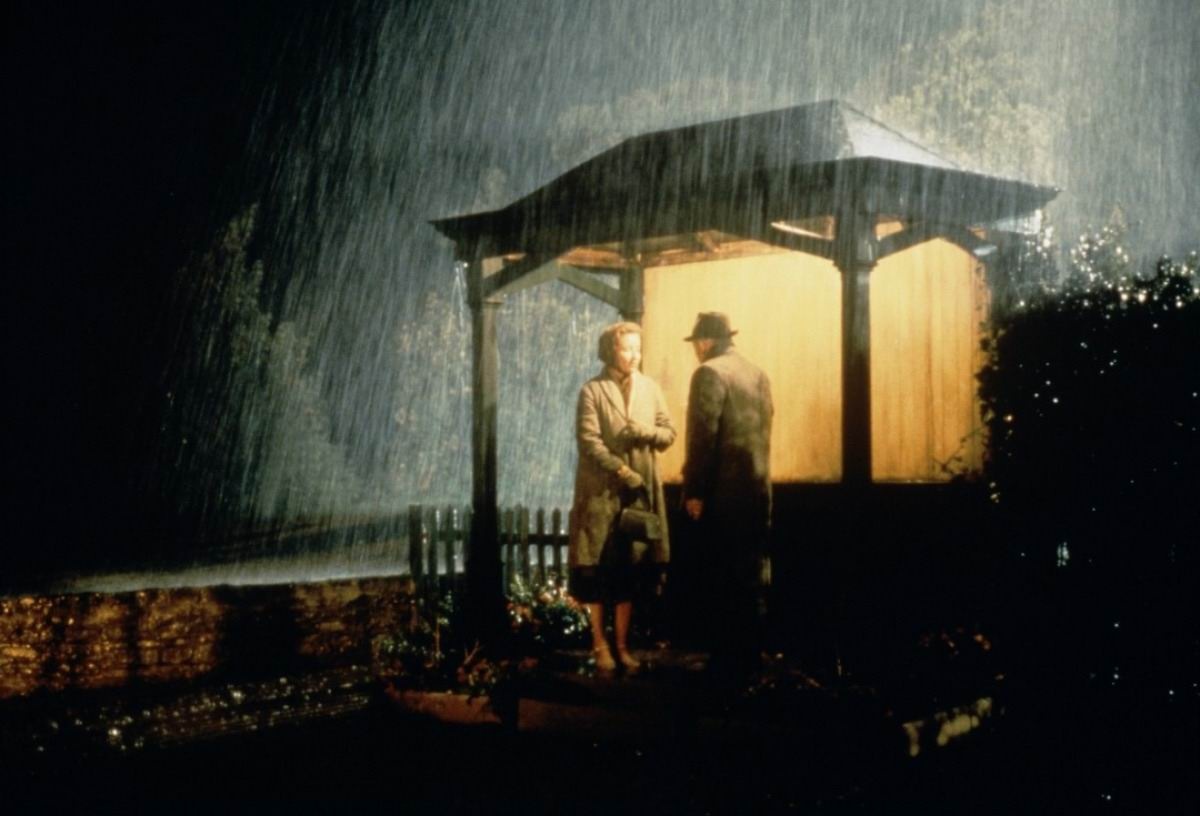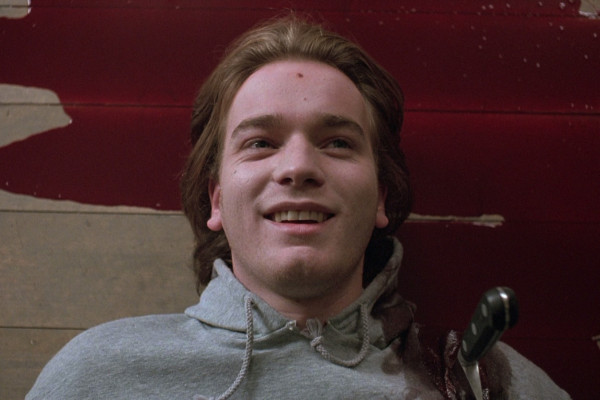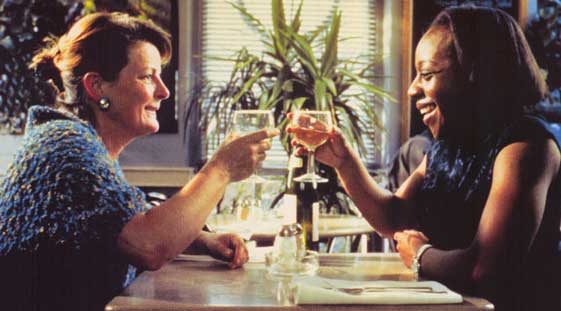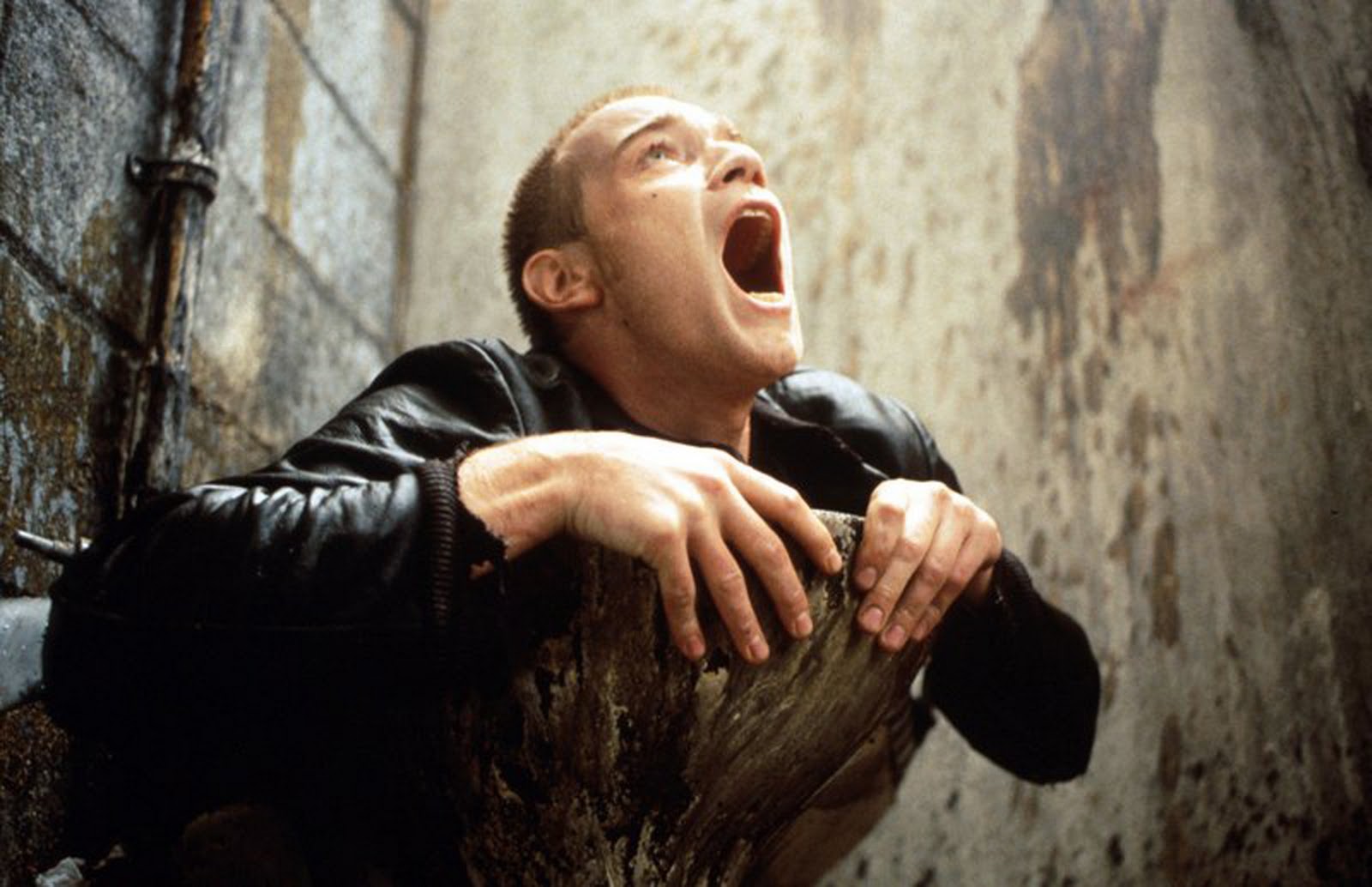8. The Madness of King George (1995)
Adapted by Alan Bennett from his own play, the film is based on the real life ‘madness’ of British monarch George III (who was in fact now believed to be suffering from acute intermittent porphyria) and an attempt by the then Prince of Wales (Rupert Everett) to have himself instated as monarch. However, despite many failed ‘primitive cures’ Dr Willis (Ian Holm) improves the King’s (Nigel Hawthorn) condition just in time.
Director (Sir) Nicholas Hytner went on to direct Bennett’s 2006 film The History Boys. Bennett himself also makes an appearance in the film. The film, also starring Helen Mirren, marked a slightly bawdier more colourful shift in heritage production. The title of the original play (The Madness of George III) was allegedly altered to aid clarity as to the royal identity of the central character and not, as urban myth speculates, to prevent audiences from assuming it was a sequel.
7. The Full Monty (1997)
Originally scripted as a 6 part TV series, Simon Beaufoy’s BAFTA winning film (directed by Peter Cattaneo) achieved even bigger box-office figures than Four Weddings. The comedy-drama focuses on a group of unemployed former steel workers who, led by Gaz (Robert Carlyle), must overcome their various issues to put on an all male strip-show at their local working man’s club. This show promises to go one better than the popular Chippendales ones the community’s women have been attending as Gaz and co will take it all off – going ‘the full monty’.
Set in a slightly ambiguous time-period, at the core of the film is the fall-out from the closing of steel works in the city of Sheffield in the 1980’s and the cataclysmic impact this had on the lives of the once proud employees.
The plot may be simple and the overall tone jovial but the social issues (divorce, male identity, unemployment, homosexuality, body image and suicide) explored via the characters (a cast list of faces familiar to Brit TV viewers inc. Mark Addy, Paul Barber and Tom Wilkinson) run deep. The film also features a memorable 70’s soundtrack; the brief ‘dancing’ in the job centre queue scene (almost cut) is instantly recognisable.
Despite some speculation to the contrary, the show reel used at the film’s opening ‘city on the move’ was taken from a genuine 1972 promo for Sheffield. It is interesting to speculate if this would have been an immediately more socially conscious historically specific film had it been produced pre May 1994; arguably it would never have gained funding or found as wider audience as it did – the face of British film had changed.
6. The Crying Game (1992)
Neil Jordan’s film was eventually a hit in the U.S after floundered at the U.K box office. Set amid a backdrop of the Irish troubles, it follows Fergus (Stephen Rea) a member of the IRA who, along with others in his group (played by Miranda Richardson & Adrian Dunbar) kidnap a British soldier Jody. Fergus bonds with Jody and when Jody is accidentally killed, Fergus seeks out the man’s girlfriend Dil (Jaye Davidson) whom he has promised to protect. Ultimately developing feelings for Dil, a surprise reveal that Dil is transgender tests Fergus’ true nature.
Its opening focusing more on soldiers and plots, the film is not what it initially appears to be, this reversal of expectation (in tune with a key aspect of the story) is perhaps what made it unpopular upon its first release. Very much a film of two halves, Fergus as an IRA member, then adopting a new identity as ‘Jimmy’ the story becomes more relationship focused – with the audience convincingly drawn in along with Fergus.
The ‘reveal’ was something the U.S release in particular played on and today remains ‘the moment’ the film is best remembered for – being referenced in 1994’s Ace Ventura Pet Detective. Despite its troubled time at the box office, the film went on to win several Academy Awards. Not the only film with an Irish flavour to hit the box office in the early 90’s, Alan Parker’s UK/US/IRE co-production The Commitments is also worthy of a mention.
5. The Remains of the Day (1993)
This Merchant-Ivory production was originally to have been directed by Mike Nichols from a script by Harold Pinter. Based on the novel of the same name, the film follows Mr Stevens (Anthony Hopkins) the former butler to recently deceased Lord Darlington (James Fox). Darlington has died disgraced following accusations of being a Nazi sympathizer.
The film uses flashback to chart Steven’s time serving Darlington alongside Housekeep Miss Kenton (Emma Thompson). During this time, it becomes apparent Kenton has feelings for Stevens but duty must come first.
Another quality heritage production period from Merchant Ivory featuring the reoccurring themes from ‘an age of repression and duty’ as embodied by Hopkins’ character contrasted against the younger more emotional Miss Kenton. There film also features a cast of ‘Brit hopefuls’ including Ben Chaplin, Lena Headey and a pre-Four-Weddings Hugh Grant.
The film was nominated for 8 Academy Awards but came up against Schindler’s List and Philadelphia. In the aftermath of Four Weddings, the definition of what justified a ‘quintessentially British film’ also altered slightly as the spotlight moved away from the more staunch ‘heritage film’.
4. Shallow Grave (1994)
Danny Boyle won a Best Newcomer Award for this, his cinematic directorial debut, about a trio of Edinburgh flatmates (played by Ewan McGregor, Kerry Fox & Christopher Ecclestone), who, upon the discovery of the sudden death of a recent illusive forth flatmate (played by Keith Allen), decide to keep the large stash of cash in his room, dispose of his body and remain quiet.
Tensions escalate after the more reserved David (Eccleston) is ‘selected’ to remove the body’s hands, feet and teeth to prevent identification, the trauma sees him become increasingly paranoid toward his more outgoing flatmates. This situation is not helped when two thugs eventually appear searching for Hugo (Allen).
Shot on a tight budget and schedule of 30 days, filming took place in Glasgow rather than Edinburgh as this meant the production was then eligible for a substantial grant. It remains as highly effective dark comedy thriller that has an original feel to its simplicity with a sense of claustrophobia as events approach their climax. Watch out for writer John Hodge as one of the police detectives. Premiering to appreciative audiences in Canne on May 17th 1994, Shallow Grave added to the Brit film buzz already circulating with Four Weddings.
3. Secrets and Lies (1996)
Mike Leigh directs another of his largely improvised dramas, this one starring Brenda Blethyn as Cynthia, a ‘typical (white) working class’ factory worker with her own dysfunctional family who is contacted by Hortense Cumberbatch (Marianne Jean-Baptise) the baby she gave up for adoption as a teenager. Matters become more complex when, still coming to terms with the situation herself, Cynthia introduces Hortense (a successful black middle-class optometrist) to her extended family – forcing them to confront difficult truths concerning their own lives.
The film received a string of nominations and awards, Blethyn’s performance is both genuine and memorable. The reveal in the cafe (filmed in a single uninterrupted take) as the recollection of truth hits Cynthia is as spellbinding as it is slightly difficult to watch – such is the empathy Blethyn’s performance creates. Timothy Spall too, puts in a fine performance as Cynthia’s brother Maurice. The film also has much to display regarding the questioning class divisions, stereotypes and identity.
2. Trainspotting (1996)
Danny Boyle’s ‘follow up’ to Shallow Grave (again scripted by John Hodge) was an adaptation of Irvine Welsh’s novel of the same name and also starred Ewan McGregor.
Renton (McGregor) is a heroin addict living a squalid life in Edinburgh along with fellow addicts and ‘associates’ Sick Boy (Jonny Lee Miller), Spud (Ewan Bremner), and the violent ‘anti-drugs’ Begbie (Robert Carlyle). The story follows Renton as he has one last hit before attempting to break clear of his addiction.
A hotly anticipated event in popular culture upon its release fuelled by its association the popular Britpop music scene (with many artists featuring on the film’s equally trendy soundtrack). There was also some press controversy regarding the potential glamorising of drug culture. The film has a very grimy ‘nether world’ look to it – something Boyle had intended to do with the film’s use of colour influenced by Frances Bacon artwork. McGregor delivers an empathic performance as the more reflective Renton.
The soundtrack and voice over/chase sequence to Iggy Pop’s Lust for Life has become an instantly recognisable and iconic piece of film. Whilst the frequent use of voice over and montage provide pace and compliment the immersive ‘in-between world’ experience it offers the viewer, there is the slight criticism that it possibly cheapens the film into an extended music video in places.
With its 20th anniversary fast approaching some debate has existed as to how well the film will age, some view it as smartly anachronistic (echoing the 10 year span of the source novel) whilst others consider it to be fixed more tellingly in mid 90’s indie fashion. Regards, both then and now Trainspotting offers a well-crafted alternative to the string of bright Curtis-esqe comedies which were becoming dominant at the time.
1. Naked (1993)
The end of the world is nigh in Mike Leigh’s dark comedy featuring a more than memorable performance from David Thewlis as Johnny, a man who flees to London from Manchester after an encounter with a young women turns sinister. Seeking refuge at the flat of his former girl friend Louise (Lesley Sharp) before embarking on a meandering odyssey of London’s street, philosophising, speculating and insulting those he encounters (including a pre-Trainspotting Ewan Bremner).
Bleak and nihilistic, the notion of self- fulfilling prophesy is reoccurring, Johnny is convinced that the world will end with the solar eclipse in 1999, there seems little meaning to anything. Similar to Shopping the film is another grimy reminder of the post-Thatcher years of early 90’s Britain and example of the more socially aware cinema the country can produce. Thewlis’ performance is recognisable to anyone who has encountered the skewed wisdom of a wandering down-on-their-luck soul on the streets of any town or city.
It is open to speculation (again permitted by Thewlis’ credible performance) if Johnny is actually suffering the symptoms of one or more undiagnosed mental health conditions. Leigh drifted from his own familiar conventions of improvisation with Naked, instead forming a script using in-character rehearsals. Perhaps slighted datable by Johnny’s 1999 prophesy, but not dated, the film remains as relevant as it ever was.
Author Bio: George Cromack is a tutor at the University of Hull’s Scarborough Campus, with a BA in Scriptwriting he also teaches evening classes in Scriptwriting and Film Studies for the WEA. Whist also working towards his PhD, he is a keen writer of both prose and script, Cold Calling, a film short written by George premiered in October 2013. Follow him on Twitter @MadBasil.
